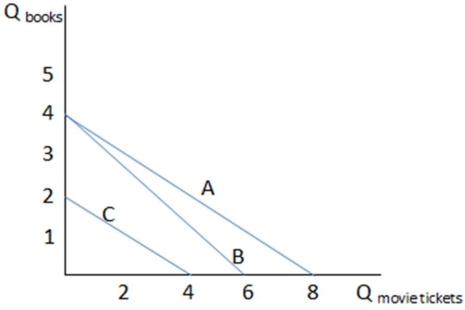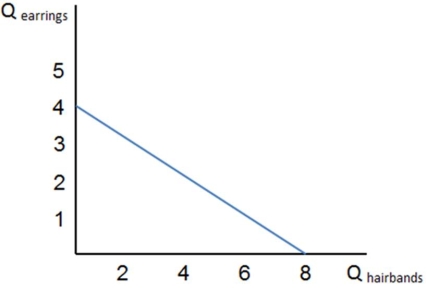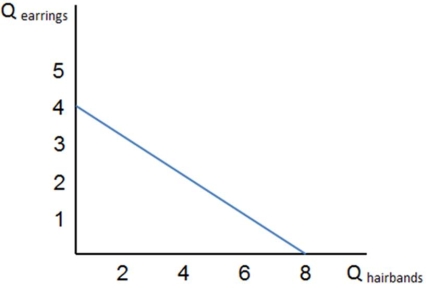A) people are rational utility maximizers.
B) people will always choose short-term benefits to longer-term payoffs.
C) people will always choose what makes them happiest.
D) people are unpredictable.
F) A) and C)
Correct Answer

verified
Correct Answer
verified
Multiple Choice
Sam has $200 a month to spend on two normal goods-tanning sessions or rounds of golf.Tanning sessions are $20 each,and a round of golf is $40.Sam currently consumes six tanning sessions and two rounds of golf.If the price of a round of golf drops to $20,the income effect:
A) predicts Sam will increase his consumption of both golf and tanning sessions.
B) predicts Sam will double his consumption of golf.
C) predicts Sam will consume more golf and less tanning sessions.
D) predicts Sam will consume less golf and more tanning sessions.
F) A) and B)
Correct Answer

verified
Correct Answer
verified
Multiple Choice
 Assume Claudia's budget constraint is demonstrated by line A in the graph shown.Which of the following would cause Claudia's budget constraint to shift to line C?
Assume Claudia's budget constraint is demonstrated by line A in the graph shown.Which of the following would cause Claudia's budget constraint to shift to line C?
A) Claudia's income increased.
B) Claudia's income decreased.
C) Claudia's preferences for these two goods decreased.
D) The prices of both goods have gone down.
F) B) and D)
Correct Answer

verified
Correct Answer
verified
Multiple Choice
Nona has just gone on a bike ride for an hour and says it gave her a utility of 7.If she chooses to continue to ride her bike for another hour:
A) we can assume she will get at least a marginal utility of more than 7.
B) we can assume she will get a marginal utility of 7.
C) we can assume she will get a marginal utility of less than 7.
D) we can assume Nona's total utility will fall because of diminishing marginal utility.
F) C) and D)
Correct Answer

verified
Correct Answer
verified
Multiple Choice
A budget constraint:
A) shows a constant dollar amount spent on different combinations of goods, and each bundle brings the same utility.
B) shows a constant dollar amount spent on different combinations of goods, and each bundle brings a different amount of utility.
C) shows a constant amount of utility gained by consuming different combinations of goods, and each bundle costs the same.
D) None of these is true.
F) None of the above
Correct Answer

verified
Correct Answer
verified
Multiple Choice
When a person's income increases:
A) more bundles of goods and services become affordable.
B) less bundles of goods and services become affordable.
C) the bundles of goods and services that become affordable don't change.
D) the bundles of goods and services that become affordable must include more expensive goods and services.
F) B) and C)
Correct Answer

verified
Correct Answer
verified
Multiple Choice
If Bob has one piece of gum in his mouth,he gains a utility of 12.If he adds a second piece to the first,it yields a marginal utility of 6; adding a third will bring marginal utility of 1.Adding a fourth piece will make Bob choke,yielding a marginal utility of 4.We can say:
A) Bob's total utility from chewing four pieces of gum would be 23.
B) Bob's total utility will decrease if he chews the fourth piece of gum.
C) Bob's total utility will be maximized if he eats two pieces.
D) Bob's total utility decreases after the first piece of gum.
F) A) and C)
Correct Answer

verified
Correct Answer
verified
Multiple Choice
When someone is served pizza and soda for dinner,it is typical behavior to eat some pizza,then drink some soda,then eat more pizza,and so on,until the person stops consuming both.How can this behavior be explained using economic concepts?
A) The individual is revealing that he can't decide whether he gains more utility from pizza or from soda.
B) People tend to act irrationally around food, and the concept of utility maximization cannot be applied.
C) The person eats pizza until his marginal utility for pizza is lower than it is for soda, then he switches to soda.
D) The concept of unlimited wants says he will never tire of eating pizza and soda.
F) None of the above
Correct Answer

verified
Correct Answer
verified
Multiple Choice
In general,the income effect of an increase in the price of a normal good:
A) will cause the individual to buy more of that good because they have relatively more income.
B) will cause the individual to buy less of that good because they have relatively less income.
C) will cause the individual to buy more of that good because they have relatively less income.
D) will cause the individual to buy less of that good because they have relatively more income.
F) None of the above
Correct Answer

verified
Correct Answer
verified
Multiple Choice
After watching a movie,Alan chooses not to watch a second and goes for a walk instead.Economists could explain his choices using the concept of:
A) budget constraints.
B) diminishing marginal utility.
C) income effect.
D) substitution effect.
F) All of the above
Correct Answer

verified
Correct Answer
verified
Multiple Choice
A utility function is:
A) an equation for calculating the most utility a particular person can derive.
B) an equation for calculating the total utility that a particular person derives from consuming a particular good over a particular time period.
C) an equation for calculating the total utility that a group of people derive from consuming a particular good.
D) an equation for calculating the total utility that a particular person derives from consuming a particular combination of goods and services.
F) A) and B)
Correct Answer

verified
Correct Answer
verified
Multiple Choice
Sam has $200 a month to spend on either tanning sessions or rounds of golf.Tanning sessions are $20 each,and a round of golf is $40.Sam currently consumes six tanning sessions and two rounds of golf.Both tanning and golf are normal goods.If the price of a round of golf drops to $20,the income and substitution effects will cause Sam's consumption of tanning sessions:
A) to increase, since both effects predict an increase.
B) to decrease, since both effects predict a decrease.
C) to change, but the direction is dependent upon which effect is stronger.
D) It is impossible to say what will happen without more information.
F) B) and D)
Correct Answer

verified
Correct Answer
verified
Multiple Choice
 Assume the graph shown shows Bobbi's budget constraint.If hairbands cost $5,then Bobbi's income to spend on these two items must be:
Assume the graph shown shows Bobbi's budget constraint.If hairbands cost $5,then Bobbi's income to spend on these two items must be:
A) $8.
B) $6.
C) $40.
D) Cannot be determined without more information.
F) B) and D)
Correct Answer

verified
Correct Answer
verified
Multiple Choice
Ethan enjoys buying books and going to the movies.He has income of $150 to spend on these two goods each month.The price of a book is $15 and the price of going to the movies is also $15.He currently consumes four books and six movies a month.If the price of a book drops to $10,the substitution effect would predict:
A) Ethan would consume more of each good.
B) Ethan would consume less of each good.
C) Ethan would consume more books and fewer movies.
D) Ethan would consume fewer books and more movies.
F) C) and D)
Correct Answer

verified
Correct Answer
verified
Multiple Choice
Corey has a blue sweater and a denim jacket.On some days he chooses to wear the sweater but on others he chooses to wear the jacket.Economists would most likely conclude that:
A) Corey's preferences have changed.
B) Corey's preferences have not changed, but other factors may have changed such as the temperature outside.
C) Corey is irrational if he wears different clothing on different days.
D) Corey is indifferent between wearing a jacket or a sweater.
F) B) and D)
Correct Answer

verified
Correct Answer
verified
Multiple Choice
The concept of utility:
A) cannot be used to explain why people are charitable.
B) cannot be used to explain why people are altruistic.
C) cannot be used to explain why people are selfish.
D) None of these is true.
F) A) and C)
Correct Answer

verified
Correct Answer
verified
Multiple Choice
Utility is:
A) maximized by rational individuals.
B) revealed by observing choices an individual makes.
C) the satisfaction individuals get from different bundles of goods.
D) All of these are true.
F) B) and C)
Correct Answer

verified
Correct Answer
verified
Multiple Choice
Sam has $200 a month to spend on either tanning sessions or rounds of golf.Tanning sessions are $20 each,and a round of golf is $50.A point on Sam's budget constraint would be:
A) 20 tanning sessions and 8 rounds of golf.
B) 10 tanning sessions and 5 rounds of golf.
C) 10 tanning sessions and 4 rounds of golf.
D) 10 tanning sessions and 2 rounds of golf.
F) A) and D)
Correct Answer

verified
Correct Answer
verified
Multiple Choice
 If the graph shown represents Celia's budget constraint,which of the following must be true?
If the graph shown represents Celia's budget constraint,which of the following must be true?
A) Celia will spend twice as much on earrings as she does hairbands.
B) Celia could consume either four pairs of earrings or eight hairbands.
C) Celia gets twice as much utility from earrings as she does from hairbands.
D) All of these are true.
F) A) and B)
Correct Answer

verified
Correct Answer
verified
Multiple Choice
Ben is asked to rate the utility he would get from reading different types of publications for the next hour.If he read a graphic novel he would get utility of 5.If he read a biography,he would get utility of 4,and if he read his economics textbook,he would get utility of 9.An economist would predict that Ben will spend his next hour reading:
A) a graphic novel.
B) a biography.
C) his economics textbook.
D) It is impossible to predict how Ben will spend his time.
F) A) and D)
Correct Answer

verified
Correct Answer
verified
Showing 21 - 40 of 130
Related Exams